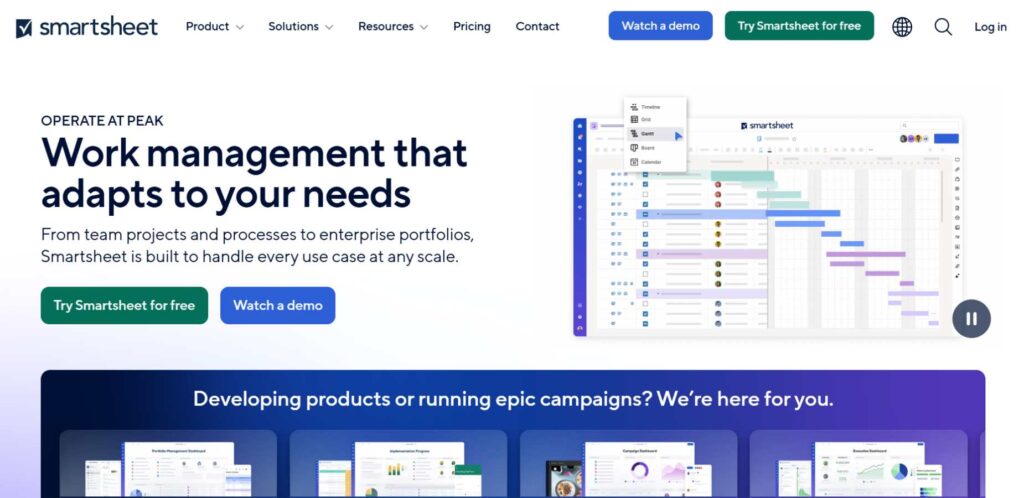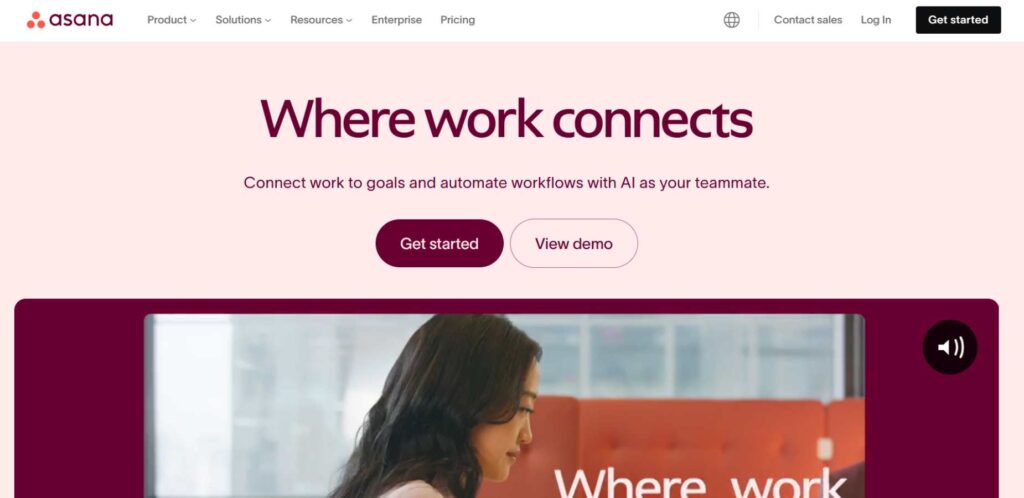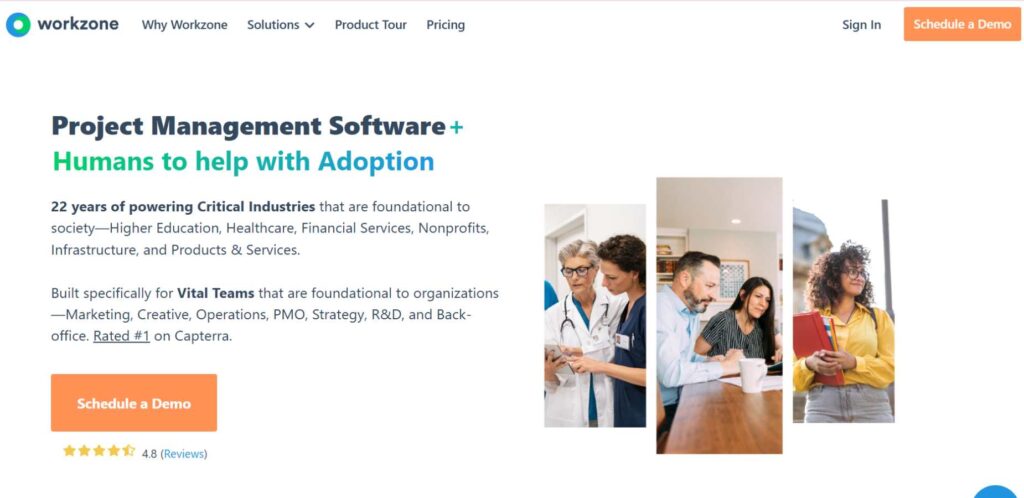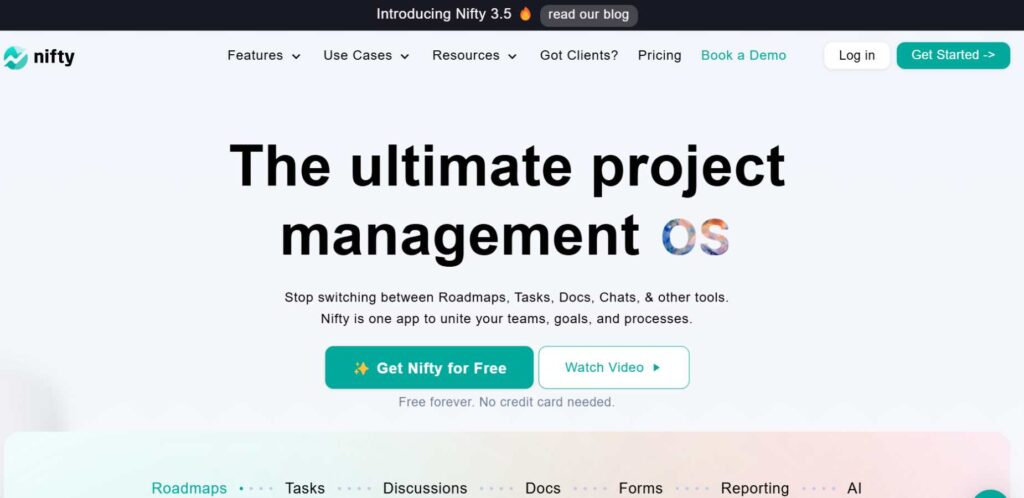Project management is essential for businesses and teams handling multiple projects. As responsibilities grow and collaboration becomes more important, traditional methods of project management often fall short. This is where project management software proves invaluable. Over the years, these tools have transformed how teams plan, execute, and monitor tasks, regardless of company size. They help streamline operations, save time, and improve communication.
This article explores some of the best project management software available today, highlighting their features, benefits, and potential drawbacks. By understanding what each tool offers, you’ll be better equipped to choose the right solution for managing tasks, resources, and team collaboration to boost productivity and achieve your goals.
Benefits of Using Project Management Software
- Improved Organization: The consolidation of all tasks, papers and messages allows to avoid confusion and keep the main objectives of the project in sight.
- Enhanced Collaboration: Using the best project management solution, the project members are in a position to post messages, feedback, and other items to the project team regardless of their geographical location.
- Better Resource Allocation: Over-allocation of resources leads to team overload, while under-allocation results in under-utilization of resources, hence the need to track resources.
- Time Efficiency: Several tools are integrated and designed to automate tasks and track working time to free up the team and make them concentrate on significant aspects of the project.
- Data-Driven Decisions: Here, performance analytics and reporting components in leading project management tools help the managers to understand project status.
- Reduced Risk of Errors: It also works wonders in minimizing chances of misunderstanding between the different work groups and maintains efficient project execution through clear task definitions and optimizing computerized processes.
Key Features to Look for in Project Management Tools
- Task Management: One of the primary functions in project management is the ability to track as well as manage tasks. Search for features that enable you to easily set up, assign and track activities.
- Collaboration Tools: It is very important for the project to have a good and efficient means of communication for the project to be successful. Simple tools such as chat, document sharing, and updates in real-time are included in the best project management software.
- Resource Management: The power to assign and supervise resources makes it possible to attain the best results. Some of the schedule components include budget tracking and identifying the availability and workloads of the team members.
- Time Tracking: Time tracking in an integrated approach allows you to coordinate the time of the groups and to meet the deadlines. Right time tracker also helps in undertaking improved planning and control of resources in relation to a particular project.
- Reporting and Analytics: Accountability and program assessment depend on the quality of the reports and measurement indicators. Select software with reporting features, which allow you to get information about the status of your project.
- Integration Options: In fact, the best project management platforms interfaces with other key tools such as email, calendar, and file-sharing systems to guarantee streamlined processes.
List of 16 Best Project Management Software
1. Monday.com

Monday.com is a simple project management tool that provides the possibility to set up its workflow and integrate automation. It presents a graphic view to monitor project plan and schedules, and allocation of resources. It also integrates with Slack, Zoom, and Google Drive and makes collaboration within a team even better. This is because it has a drag-and-drop platform and is easy to use, ideal for all teams. This is especially because Monday.com can be used in the regular organization of tasks and in complex projects and across various industries while providing a clear view of work progress.
Key Features:
- Customizable dashboards
- Automation for repetitive tasks
- Visual timelines and workload tracking
- Integration with apps like Slack, Zoom, and Google Drive
Best For:
- Task management
- Team collaboration
- Agile workflows
Pricing:
- Free
- Basic: $9 month
- Standard: $12 seat /month
- Pro: $19 seat /month
- Total 190 / month
- Billed annually
Rating: 4.7/5
Website: https://monday.com/
2. Smartsheet

It is like a combination of a spreadsheet and a project management system in that it can do everything that a spreadsheet can do and more. It can be recommended for the practical assignment of the work process, tasks, and resources. Featuring automatic processes, file sharing and updates, it enhances productivity of a team. It has a powerful reporting system and compatibility with Microsoft Teams and Salesforce and others. I found out that Smartsheet is quite appropriate for data-driven projects as it provides many templates that help you get started with your planning and executing activities.
Key Features:
- Grid, Gantt chart, and card views
- Workflow automation
- Resource and portfolio management
- Collaboration and reporting tools
Best For:
- Spreadsheet-based project management
- Enterprise-level teams
- Workflow automation
Pricing:
- Pro: $9 per Member/month
- Business: $ 19 per Member/month
- Enterprise: Custom pricing
- Advanced Work Management: Custom pricing
Rating: 4.6/5
Website: https://www.smartsheet.com/
3. Businessmap

Businessmap is more than a tool for simple project management. It extends its capabilities to managing multiple project portfolios and has a strong focus on connecting strategy to execution. It helps organizations to connect high-level goals to daily operations, ensuring every initiative contributes to strategic outcomes.
Portfolio boards allow leaders to see and track project progress from a glance, while team workspaces support efficient task management through highly customizable features such as cross-functional collaboration, WIP limits, prioritization options, automation, and more. With AI-powered smart canvas managers can visualize all dependencies across the organization and analyze work performance in a single environment.
Key features:
- Multiple workflow views (Kanban boards, Gantt chart, Timeline)
- Built-in OKRs
- Advanced reporting (dashboards and workflow analytics)
- Automated rules
- Integration with third-party tools
Best for:
- Managing project portfolios
- Aligning teams and work around company strategy
- Middle to large-sized teams
Pricing:
- Free 14-day trial
- $9.93/user/month for 15 users (billed annually)
- Custom enterprise pricing
Rating: 4.8/5
Website: https://businessmap.io/
4. Wrike

Wrike is the effective project management tool designed for the medium and large teams. It has features of Gantt chart, workload, and activity stream to ensure that work flow and progress is well monitored. The Wrike also provides personalized dashboards and works well with other tools, such as Salesforce and Adobe Creative Cloud to improve collaboration. The features such as extended reporting and enhanced workflow enhance the project delivery. Wrike was developed especially for fast-moving teams, and it fits such fields as marketing, IT, and product management to provide seamless project performance.
Key Features:
- Custom workflows and dashboards
- Time tracking and resource allocation
- Advanced analytics and reporting
- Integration with over 400 tools
Best For:
- Marketing teams
- Cross-departmental collaboration
- Resource management
Pricing:
- Free
- Team: $10 user/ month
- Business: $24.80 user/ month
- Enterprise: Custom pricing
Rating: 4.6/5
Website: https://www.wrike.com/
5. Celoxis

Celoxis is also a fully integrated project management software that includes tools for planning, tracking and allocation. The application includes the interactive Gantt charts, the time track, and the budget to assist the team to work within schedule and cost limits. Celoxis is particularly outstanding in the superior reporting and analytics that will be useful in decision making. It synchronizes with other programs such as QuickBooks and Slack making work easier. Introducing the multifunctional tool for business, Celoxis is compatible with both the conventional and the more popular agile project management styles.
Key Features:
- Advanced project planning tools
- Portfolio and resource management
- Custom workflows and dashboards
- Financial tracking and forecasting
Best For:
- Complex project management
- Resource-intensive teams
- Budget tracking
Pricing:
- Essential: $25 Monthly Per User/ Billed Annually
- Professional: $35 Monthly Per User/ Billed Annually
- Business: $45 Monthly Per User/ Billed Annually
- Enterprise: Custom Pricing
Rating: 4.5/5
Website: https://www.celoxis.com/
6. Asana

Asana makes project management easier with an intuitive and minimalistic layout. It allows team members to allocate tasks, specific deadlines and progress through the Kanban boards, lists or even a calendar. Some of the additional elements, such as tasks that depend on others, fields for additional information, and automation help a lot. Asana works with over 200 apps, teams and companies like Slack and Google Workspace to enhance the collaboration. Especially for the teams of various sizes, it offers great opportunities to work on simple as well as on complex projects and coordinate all the team members.
Key Features:
- Task dependencies and milestones
- Multiple project views (list, board, calendar)
- Integration with tools like Slack and Dropbox
- Automated workflows and rules
Best For:
- Task management
- Small to medium-sized teams
- Collaborative workflows
Pricing:
- Free
- Starter: $6 Per user, per month billed annually
- Advanced: $15.74 Per user, per month billed annually
- Enterprise: Custom Pricing
- Enterprise+: Custom Pricing
Rating: 4.7/5
Website: https://asana.com/
7. ClickUp

ClickUp is an integrated workplace communication, project management, and task collaboration tool created for project managers. It has features like views including Kanban, Gantt, and calendar to fit the various projects. Such aspects as the duration of operations, goal setting and defined operations and automation increases effectiveness. It is highly customizable as it connects with many apps such as with Slack, Trello, and GitHub among others. For both start-ups and large business, ClickUp makes available a rich set of features that help to centralize and manage work within one application.
Key Features:
- Multiple project views
- Built-in time tracking
- Custom fields and templates
- Integration with over 1,000 tools
Best For:
- Startups and growing teams
- Time tracking and reporting
- Customizable workflows
Pricing:
- Free
- Unlimited: $7
- Business: $12
- Enterprise: Custom Pricing
Rating: 4.8/5
Website: https://clickup.com/
8. Jira

Jira, which is produced by Atlassian, is among the most popular tools used for agile project management and software development. It supports Scrum, Kanban, and all sorts of the ‘in between,’ basically it supports all forms of agile teams. Some of the features are backlog prioritization, sprint planning, and increased reporting. Confluence integrates with development tools such as GitHub and Bitbucket to improve the development of code. Jira is a tool that has customizations and automation rules especially powerful for technical teams who need to track and manage software projects at the same time.
Key Features:
- Agile boards
- Sprint and backlog management
- Advanced reporting and analytics
- Integration with developer tools
Best For:
- Agile and software development teams
- Bug and issue tracking
- Sprint planning
Pricing:
- Free
- Standard: $7.53 per user / month
- Premium: $13.53 per user / month
- Enterprise: Custom Pricing
Rating: 4.6/5
Website: https://www.atlassian.com/software/jira
9. Hub Planner

Hub Planner is designed for resource management and planning for the teams. It includes dynamic scheduling interface, timesheets, detailed resource reporting to help to manage resources appropriately. Hub Planner works in sync with other apps such as Slack, and Google Calendar making coordination easier. That makes it suitable for managing team workloads by planning the capacity it requires and forecasting projects. Hub Planner is created for agencies and enterprises to help manage time and properly allocate resources, making the work on projects faster and the overall productivity higher among teams.
Key Features:
- Resource scheduling and forecasting
- Timesheet tracking
- Real-time analytics
- Calendar and integration features
Best For:
- Resource planning
- Creative agencies
- Large-scale project tracking
Pricing:
- Plug & Play: $7 per resource / per month
- Premium: $18 per resource / per month
- Business Leader: $54 per resource / per month
Rating: 4.5/5
Website: https://hubplanner.com/
10. ProofHub

ProofHub is an effective project management software that is easy to implement for organization of team communications. It provides tools for task management and assignment tracking, Gantt charts, working hours tracker, and online proofing to facilitate the feedback collection. The software is integrated with communication tools such as chat and discussions that can help teams to alleviate the problem.
ProofHub singles out and connects with apps such as Google Drive, and so on the list goes on, to improve on file sharing. For that reason, it can be applied to various industries, and it is frequently found in marketing and design. As a result, ProofHub makes sure that all teams are always on the same page, the planning phase not excluded.
Key Features:
- Task management with custom workflows
- Online proofing and feedback tools
- Team discussions and chat
- Gantt charts and time tracking
Best For:
- Creative teams and agencies
- Collaborative feedback processes
- All-in-one project management
Pricing:
- Flat rate starting at $89/month
- Essential: $45/ month
Rating: 4.5/5
Website: https://www.proofhub.com/
11. Scoro

Scoro is an all-round business management software that allows tasks such as project scheduling, tracking time, CRM, and billing. It has features which help people to organize tasks, assign resources, and control effectiveness. That is why agencies and consultancies must consider it because of its rich dashboard and financial tools.
Scoro can also link with tools that include Xero, QuickBooks, Zapier so as to make the workflows more enhanced. Thus the Scoro project management combines managing a project and running a business with the same core tools.
Key Features:
- Task and project management
- CRM and invoicing integration
- Time tracking and billing
- Comprehensive reporting and analytics
Best For:
- Professional services
- Financial management
- Comprehensive business management
Pricing:
- Essential: $26 per user/month
- Standard: $37 per user/month
- Pro: $63 per user/month
- Ultimate: Custom
Rating: 4.6/5
Website: https://www.scoro.com/
12. Hive

Hive is a project collaboration tool which focuses on the work itself and team output. It comprises task list, control of automation, time control, and communication features. Hive works with tools such as Zoom and Slack, providing additional comfort to working in distant environments.
It offers more than one perspective on tasks, for example Gantt diagrams, scrum boards, and timers. As a result, Hive offers real-time and plethora of other features that assist teams in pinpointing problems, finding ways to make their work processes more efficient and increase productivity.
Key Features:
- Task management with multiple views
- Built-in email and chat features
- Workflow automation
- Advanced analytics and reporting
Best For:
- Collaborative and dynamic teams
- Project tracking and automation
- Real-time communication
Pricing:
- Free
- Starter: $1/ month per user
- Teams: $3/ month per user
- Enterprise: Custom
Rating: 4.5/5
Website: https://hive.com/
13. Zoho Projects

Zoho Projects is a highly effective and well-established project management software which is very easy to use and not expensive. Some of the tools include automation and tasks, Gantt charts, resources, and time. Its biggest strength is that it connects seamlessly to other Zoho applications and third-party services such as Slack, and Google Suite. Due to this flexibility, the software is ideal for different industries. In either minor operations or massive projects supervision, the Zoho Projects establish productivity and goal-set courses for the teams.
Key Features:
- Task automation and milestone tracking
- Gantt charts and timesheets
- Budgeting and expense tracking
- Integration with Zoho ecosystem
Best For:
- Budget-conscious teams
- Small businesses
- Cross-functional teams
Pricing:
- Free
- Premium: ₹280 /user/month billed annually
- Enterprise: ₹630/user/month billed annually
Rating: 4.5/5
Website: https://www.zoho.com/projects/
14. Workzone

Workzone is an effective collaborative project management software recommended for teams that work on several projects. As we know it is a way to manage tasks, share documents and have meetings in one place. Even its real-time dashboards and progress tracking helps teams track their deadlines effectively.
Workzone also has other provided different functions like Gantt charts or resource management to enhance productivity. From apps such as Slack to Dropbox, Workzone makes collaboration possible since it integrates with them. Originally, it is suitable for marketing teams, agencies, and other organizations that need a more effective cooperation.
Key Features:
- Detailed task tracking and project templates
- Robust reporting tools
- Document sharing and collaboration
- Time tracking and workload management
Best For:
- Marketing teams
- Cross-departmental collaboration
- Simple yet effective tracking
Pricing:
- Team: $24/user per month
- Professional: $34/user per month
- Enterprise: $45/user per month
Rating: 4.6/5
Website: https://www.workzone.com/
15. Nifty

Nifty is an innovative project management tool developed to facilitate team work. Some of them include; assigning tasks, tracking milestones, tracking time, and internal conversations within the application. This visual strategy helps to maintain the focus of the teams on strategic plans in the long term.
There is seamless connectivity with other common platforms such as Google Docs and Zoom in this case of Nifty. Perfect for distributed teams, it is monolithic yet contain all the necessary features. That is why Nifty is an effective tool for managing complex projects with a minimum of tool-switching.
Key Features:
- Milestone tracking and roadmaps
- Built-in chat and collaboration tools
- Kanban, timeline, and list views
- Integration with GitHub, Slack, and more
Best For:
- Startups and remote teams
- Task prioritization
- Agile workflows
Pricing:
- Free
- Starter: $39per month, billed annually
- Pro: $79 per month, billed annually
- Business: $124 per month, billed annually
- Unlimited: $399 per month, billed annually
Rating: 4.6/5
Website: https://niftypm.com/
16. Trello

Trello is a light, highly graphical tool based on the Kanban system. It has an easy to use drag-and-drop feature to help users arrange the tasks into boards, lists and cards. Customization can be done through Power-Ups, most of which include calendar views, time tracking, and connection to programs such as Slack and Google Drive.
It is ideal for people and work groups who prefer straightforward and comprehensible tools. For both personal and professional tasks, Trello is relevant, as it allows the users to see at a glance what is being done.
Key Features:
- Customizable Kanban boards
- Power-ups for extended functionality
- Automation with Butler
- Integration with apps like Slack and Google Drive
Best For:
- Visual task management
- Small teams and freelancers
- Simple project workflows
Pricing:
- Free
- Standard: 5USD Per user/month if billed annually ($6 billed monthly)
- Premium: $10USD Per user/month if billed annually ($12.50 billed monthly)
- Enterprise: $17.50USD Per user/month – billed annually ($210.00 annual price per user)
Rating: 4.6/5
Website: https://trello.com/
How to Choose the Right Project Management Software for Your Needs
- Identify Your Goals: Establish the purpose of project management tool to meet the achievement of your goals. Do you need better ways to help your teams work together, know more about what is being spent, or streamline a process?
- Consider Scalability: Make sure it will expand with the increasing number of your staff. Choosing the best project management should involve products that are useful for small teams and large organizations.
- Evaluate Ease of Use: An interface easy to use is a must since the general public has to adopt the technology. Choose the software that can be easily understood and would not need too much of a training run through.
- Assess Integration Capabilities: It is crucial to be able to connect with tools that you are using, for example client relation management systems and communication tools.
- Budget Appropriateness: Check the price packages and services to know whether or not you are getting a good deal. Most top project management software come with a price, however, most of them will provide a frequency nk in which they can be availed depending on the prices.
- Customer Support: A good customer support service helps in easy onboarding and in case a product has an issue, the same support will assist in fixing it. Choose software that has support available and promptly when needed.
Conclusion
Project management software has become essential in modern workplaces, offering solutions to enhance teamwork, speed, and project execution quality. A good project management tool should include features like task tracking and data visualization.
Understanding the advantages, tools, and potential drawbacks of these software options will help you make the right choice for your team. Selecting the right tool not only saves time and costs but also helps your team achieve goals more efficiently.
FAQs
1. What is this software being applied for?
They enable teams to have strategies for planning, monitoring and executing projects since it orients tasks as well as communication.
2. Which of these tools are best for small teams?
There are some valuable tools, such as Trello, Asana, and Monday, which are easy to use and are suitable for small teams.
3. Is it possible to use these tools with other applications?
Yes, it is a feature since most tools connect with other apps such as communication platforms like slack or Google workspace or even CRMs.
4. Are these tools expensive?
Free plans are available while the paid plans for the enhancing features are relatively cheaper and made available for the businessy types of users.
5. What can I do to ensure my team embraces these tools?
Give out training on its usage, develop an interest in its features, and show how it enhances working relations and productivity.

